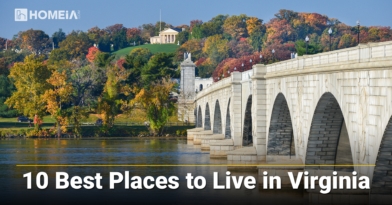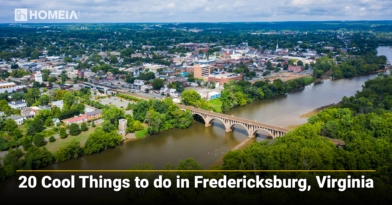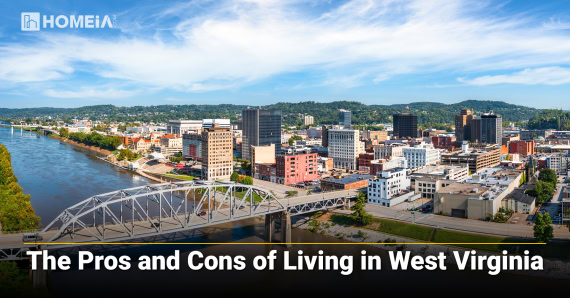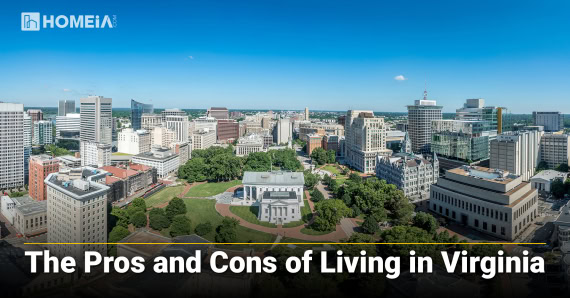Moving to Virginia: THE Complete Relocation Guide & Checklist
- Local Editor:Local Editor: Genevieve Dabrowski
Published: Jul 31, 2025
- Category: Moving , City Living Guide
There’s no place quite like Virginia. With its rich history, diverse landscapes, and thriving economy, the Old Dominion State is a remarkable place to call home. Whether you’re drawn by the scenic Blue Ridge Mountains, the bustling energy of Northern Virginia’s tech corridor, or the Atlantic coastline’s natural beauty, you’ll find plenty to love here.
This comprehensive Virginia moving guide is your one-stop resource for everything you need to know before you relocate, including a cost-of-living breakdown, a job market analysis, and a list of the best places to live and how to settle in. Are you dreaming of Arlington’s urban sophistication, Richmond’s historic charm, Virginia Beach’s coastal lifestyle, or Charlottesville’s college town atmosphere? No matter your goals, we’ll help you make an informed decision about your Virginia relocation.
10 Best Places to Live in Virginia
Virginia is an amazing place. Where else can you find mountains and beaches, high-end horse-racing communities and small towns with neighbors who travel by wagon — all within a two-hour drive?…
Table of Contents:
- Why Choose Virginia for Your Next Adventure?
- 1. The Old Dominion Experience
- 2. Cost of Living & Affordability in Virginia
- 3. Jobs, Economy, and Career Opportunities in Virginia
- 4. Education Excellence in Virginia
- 5. Virginia Tax Structure
- 6. Best Places to Live in Virginia
- 7. Planning Your Virginia Move
- 8. Virginia’s Unique Requirements
- 9. Financial Planning
- Insider Tips from a Virginia Local
- Frequently Asked Questions
Why Choose Virginia for Your Next Adventure?
Virginia consistently ranks among America’s most desirable relocation destinations, attracting over 300,000 new residents annually. Many are drawn here by the state’s unique combination of economic opportunity, natural beauty, and exceptional quality of life. The Old Dominion State offers something truly special: a place where you can advance your career in thriving industries while living just hours from both mountains and ocean.
For those seeking to optimize their work-life balance, Virginia’s four-season climate, robust job market, and proximity to Washington, D.C. make it a prime destination. From the technology corridors of Northern Virginia, known to locals as “NOVA,” to the defense industry in Hampton Roads, the state offers exceptional career advancement opportunities. And for those who appreciate our nation’s history, Virginia also boasts a culture that values heritage preservation and community engagement.
Mission Table: How This Guide Helps You Relocate to Virginia
| Mission Area | How This Guide Supports You |
|---|---|
| Research & Planning | Gives you the inside scoop on Virginia cities, regional communities, living costs, neighborhoods, and what to expect when you relocate. |
| Financial Preparedness | Helps you budget for Virginia’s cost of living and get your finances ready for Old Dominion living. |
| Legal & Documentation | Walks you through Virginia residency requirements, vehicle registration, and the essential paperwork for your move. |
| Community Integration | Tips for making friends, finding local resources, and feeling at home in your new community. |
| Ongoing Support | Answers your relocation questions and provides comprehensive checklists for every step of your move. |
Pros and Cons of Living in Virginia
In this article, we will discuss some of the advantages and drawbacks of life in Virginia. We will also explore some of the best cities in Virginia for different types of individuals and families…
1. The Old Dominion Experience
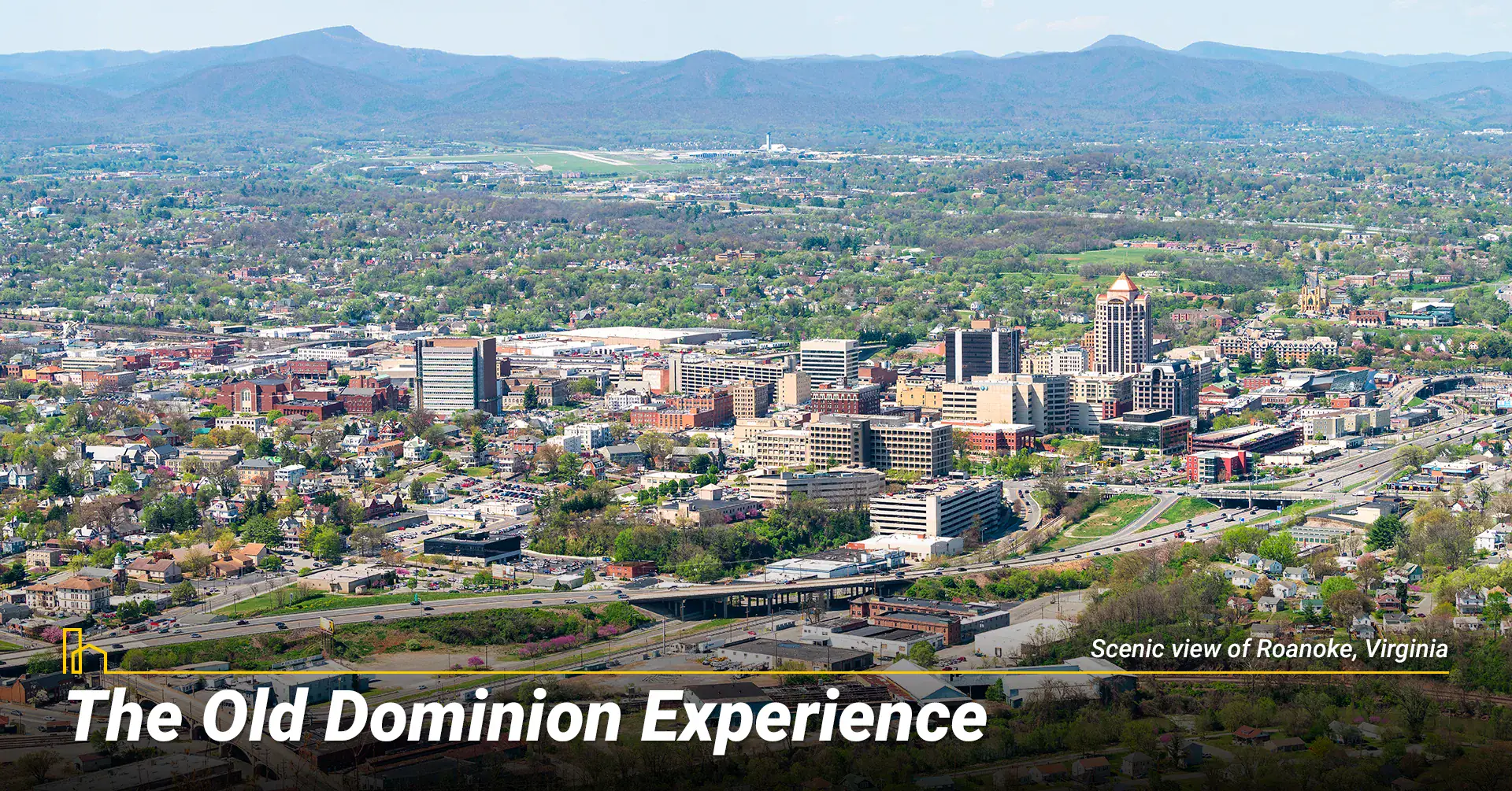
A. Virginia Culture & Lifestyle
Living in Virginia means embracing a rich blend of history, innovation, and natural beauty. From the busy DC suburbs to the slower-paced small town charm of Leesburg or Staunton, you’ll find neighbors who value tradition while embracing progress and maintain strong community bonds.
Virginia’s culture reflects diverse influences, including its colonial heritage, Civil War history, and the many newcomers seeking an East Coast lifestyle with Southern hospitality. Virginians are especially passionate about education, historic preservation, and outdoor recreation, with a deep appreciation for the state’s role in American history.
B. The Food Scene: Coastal Treasures and Southern Traditions
Virginia’s food scene seamlessly blends Chesapeake Bay seafood traditions with Southern comfort food and innovative, farm-to-table cuisine. Among the state’s distinctive specialties are Chesapeake Bay blue crabs, which are celebrated throughout the region from spring to fall. The famous Smithfield ham, cured using traditional methods, represents centuries of Virginia culinary heritage.
Virginia leads the East Coast’s wine renaissance with over 300 wineries spread across the state, making regions like Charlottesville and Loudoun County internationally recognized wine destinations. The Virginia Wine Festival, held annually in various locations, attracts wine enthusiasts worldwide, while local vineyards like Barboursville, King Family, and Veritas have achieved national recognition for their exceptional vintages.
Throughout the state, the farm-to-table movement showcases fresh, locally-sourced ingredients from Virginia farms and coastal waters throughout the Tidewater and Shenandoah Valley regions. Weekend farmers markets in every major city offer direct access to local producers, artisanal foods, and seasonal specialties like Virginia peanuts and fresh oysters.
The Pros and Cons of Living in West Virginia
The Pros and Cons of Living in West Virginia include stunning natural landscapes, low cost of living, and a strong sense of community. However, challenges such as limited job opportunities, rural isolation, and infrastructure gaps make it important to weigh your priorities before relocating to the Mountain State…
C. Outdoor Life & Recreation
Virginia offers exceptional outdoor recreation opportunities that attract day-trippers and adventure seekers alike from across the East Coast. The state boasts Shenandoah National Park with its 105-mile Skyline Drive, providing breathtaking mountain vistas and over 500 miles of hiking trails that accommodate every skill level, from easy family walks to challenging backcountry adventures.
The Atlantic coastline provides world-class beach recreation along 112 miles of pristine shoreline. Virginia Beach, the Outer Banks’ northern reaches, and the Eastern Shore offer premier water sports, fishing, and beach activities with reliable warm weather from May through September. These Virginia coastal destinations attract visitors globally for exceptional surfing, fishing, and beach experiences.
Virginia isn’t just for beach lovers. The Blue Ridge Mountains offer excellent hiking and camping opportunities at locations like Old Rag Mountain, Mount Pleasant, and the Appalachian Trail. The state’s numerous rivers, including the James, Rappahannock, and Shenandoah, provide excellent kayaking, canoeing, and world-class fishing experiences.
For history enthusiasts, Virginia offers unparalleled opportunities to explore Colonial Williamsburg, Civil War battlefields, and presidential homes like Monticello and Mount Vernon throughout the state’s historic regions.
D. Weather & Climate
Virginia enjoys four distinct seasons with mild winters and warm summers, experiencing significant weather variations across the Tidewater, Piedmont, and mountain regions. Summers are warm and humid, with afternoon thunderstorms common in mountainous areas. Winters bring moderate temperatures and occasional snowfall, especially in the Shenandoah Valley and Blue Ridge Mountains, while coastal areas enjoy milder winters with abundant sunshine.
Spring and fall are spectacular seasons, with spring attracting visitors for its dogwood blossoms and cherry trees, while autumn offers brilliant fall foliage throughout Virginia’s forests and mountains. The state’s moderate climate and seasonal variety create comfortable conditions year-round for outdoor activities and coastal recreation.
Virginia does experience some weather challenges. Coastal areas can be affected by hurricanes and tropical storms, particularly from June to November. Winter storms can impact western regions, while occasional ice storms affect the entire state. It’s recommended to stay informed about weather alerts and maintain emergency preparedness supplies.
Recommended for you
2. Cost of Living & Affordability in Virginia
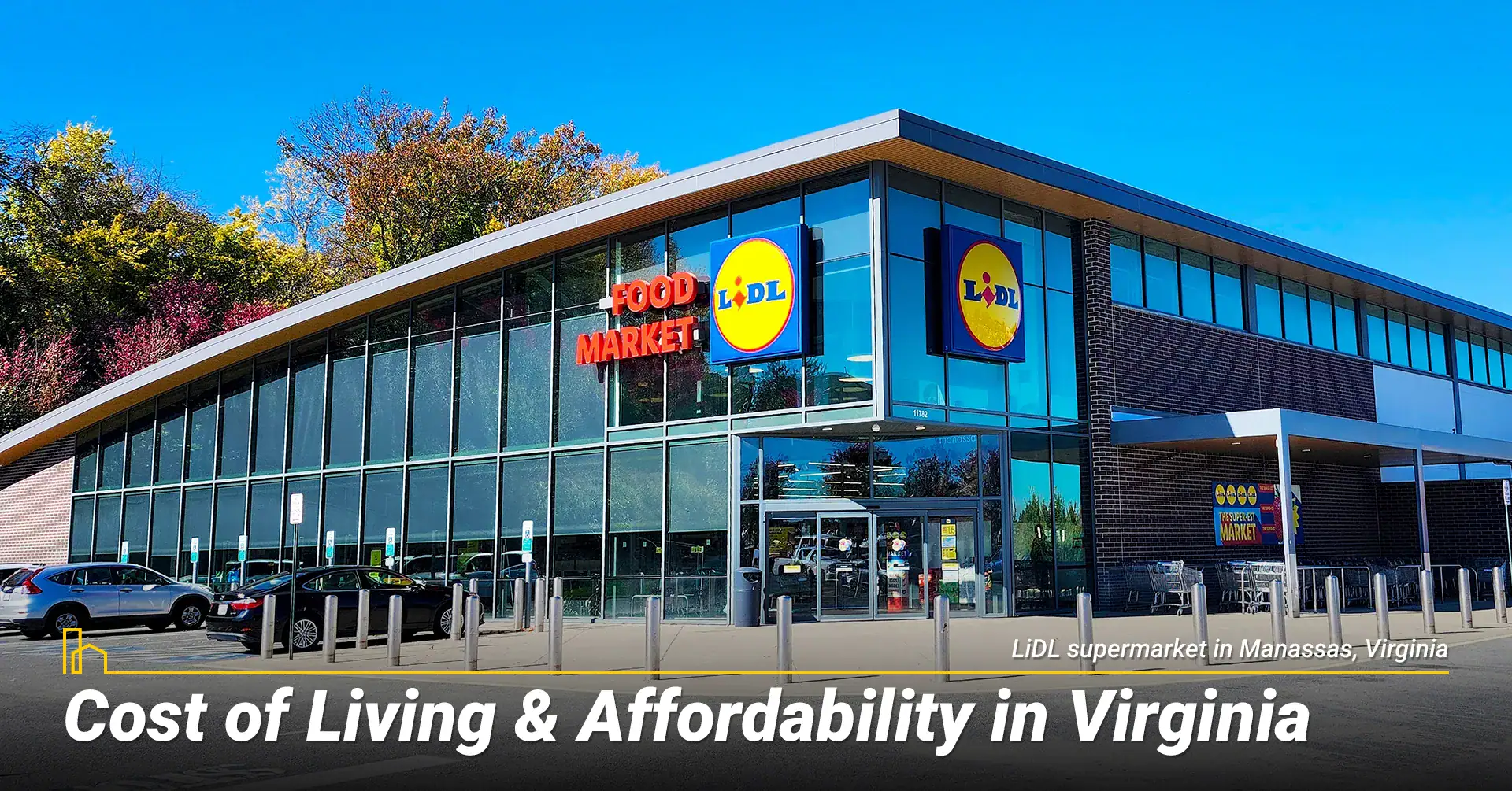
Virginia’s cost of living varies significantly by region, running approximately 6% higher than the national average in Northern Virginia, while many other areas remain close to or below national averages. The variation primarily depends on proximity to Washington, D.C. and other major metropolitan areas, with housing costs being the primary driver of regional differences.
A. Virginia Housing Market Overview
Understanding Virginia’s housing market is crucial for successful relocation planning, as costs vary dramatically by region and proximity to major employment centers. Northern Virginia commands premium prices due to its Washington, D.C. proximity, while other regions offer more affordable options. This comprehensive breakdown helps you budget effectively and identify areas that match your financial goals and lifestyle preferences.
| City/Region | Median Home Price | 1BR Rent | 2BR Rent | 3BR Rent (Apartment) | 3BR Rent (House) |
|---|---|---|---|---|---|
| Arlington/NOVA | $725,000 | $2,100 | $2,700 | $3,200 | $3,500–$4,500 |
| Richmond | $348,000 | $1,250 | $1,600 | $1,900 | $2,200–$2,900 |
| Virginia Beach | $365,000 | $1,350 | $1,750 | $2,100 | $2,400–$3,200 |
| Charlottesville | $425,000 | $1,300 | $1,650 | $2,000 | $2,300–$3,000 |
| Roanoke | $245,000 | $950 | $1,200 | $1,450 | $1,600–$2,200 |
B. Daily Living Expenses
Monthly utilities typically total $260, including electricity ($110), natural gas ($35), water ($48), and internet ($67) across Virginia’s major metropolitan areas. Grocery costs run 3% higher than national averages, at approximately $425 per person per month. Transportation costs vary significantly by region, with Northern Virginia requiring higher costs due to tolls and parking, while gas prices average around $3.15 per gallon throughout the state.
Living in Virginia: What is it like?
What is it like to live in Virginia? The state offers a mix of rich history, scenic beauty, and modern opportunity. With strong job markets, quality schools, and diverse communities—from small towns to urban centers — Virginia appeals to families, professionals, and retirees seeking a balanced, high-quality lifestyle in a beautiful setting…
3. Jobs, Economy, and Career Opportunities in Virginia

Virginia’s economy remains robust and diversified, with an unemployment rate of around 3.8% across major metropolitan areas. The state offers exceptional career opportunities across multiple growing sectors that continue to attract major companies and talented professionals seeking proximity to the nation’s capital and excellent quality of life.
A. Major Industries
Technology and Innovation: Virginia has emerged as a major East Coast tech hub, with Northern Virginia serving as a critical data center corridor hosting major cloud computing infrastructure. Companies including Amazon (HQ2), Microsoft, Google, and hundreds of startups have chosen Virginia for its highly educated workforce, connection to government, and business-friendly environment.
Government and Defense: Virginia’s proximity to Washington, D.C., creates unparalleled opportunities in federal contracting, cybersecurity, and defense industries. Major defense contractors like Lockheed Martin, Raytheon, Booz Allen Hamilton, and CACI maintain significant operations throughout Northern Virginia and Hampton Roads.
Healthcare and Life Sciences: Virginia’s healthcare industry continues expanding rapidly, anchored by major health systems like INOVA, Sentara, VCU Health, and UVA Health, all providing world-class medical care. The biotechnology sector includes companies like Altria, Qiagen, and numerous research institutions leading innovations in medical research.
Financial Services: Richmond serves as a major financial hub, with Capital One headquartered there alongside significant operations from other major banks and financial institutions. The state benefits from its business-friendly regulatory environment and skilled workforce.
B. Job Markets by City
Virginia’s diverse economy creates distinct employment opportunities across different metropolitan areas, each with unique industry strengths and employer concentrations. Understanding regional job markets helps you target your search effectively and identify locations that align with your career goals. This analysis highlights key industries and major employers driving each region’s economic growth and employment opportunities.
| Metro Area | Key Industries | Notable Employers |
|---|---|---|
| Arlington/NOVA | Technology, federal contracting, consulting, cybersecurity | Amazon HQ2, Booz Allen Hamilton, INOVA Health, Microsoft |
| Richmond | Finance, government, healthcare, education | Capital One, VCU Health, Dominion Energy, Altria |
| Virginia Beach | Military, tourism, healthcare, logistics | Naval Station Norfolk, Sentara Healthcare, GEICO |
| Charlottesville | Education, healthcare, research, tourism | University of Virginia, UVA Health, PRA Health Sciences |
| Roanoke | Healthcare, manufacturing, transportation | Carilion Clinic, Norfolk Southern |
9 Steps to Buying a House in Virginia
The following guide will explain what you need to know, helping you better understand how you can proceed step-by-step from the dream of owning a Virginia home to the reality of moving into one…
4. Education Excellence in Virginia

Virginia combines outstanding public school systems with prestigious universities throughout the state. Virginia public schools consistently rank among the top in the nation, with continued investment in STEM education, advanced placement programs, and college preparation initiatives.
A. Public School System
Virginia public schools consistently rank in the top 10 nationally, with many districts offering innovative programs and exceptional college preparation curricula. Fairfax County, Loudoun County, and Virginia Beach school districts are particularly renowned for their academic excellence and comprehensive educational offerings.
B. Higher Education
Top Virginia universities include the University of Virginia in Charlottesville (renowned for business, law, and medical programs), Virginia Tech in Blacksburg (exceptional engineering and agriculture programs), the College of William & Mary in Williamsburg (historic liberal arts excellence), George Mason University in Fairfax (strong business and law programs), and Virginia Commonwealth University in Richmond (outstanding medical and arts programs). Numerous community colleges throughout the state provide affordable pathways to higher education and career training programs.
7 Most Affordable Places to Live in Virginia
Virginia holds a prominent place in our nation as one of the original 13 Colonies and the birthplace of eight U.S. presidents. The state offers diverse natural beauty, from the Blue Ridge Mountains and Shenandoah National Park to the beaches of the Atlantic coast and the Chesapeake Bay.
5. Virginia Tax Structure
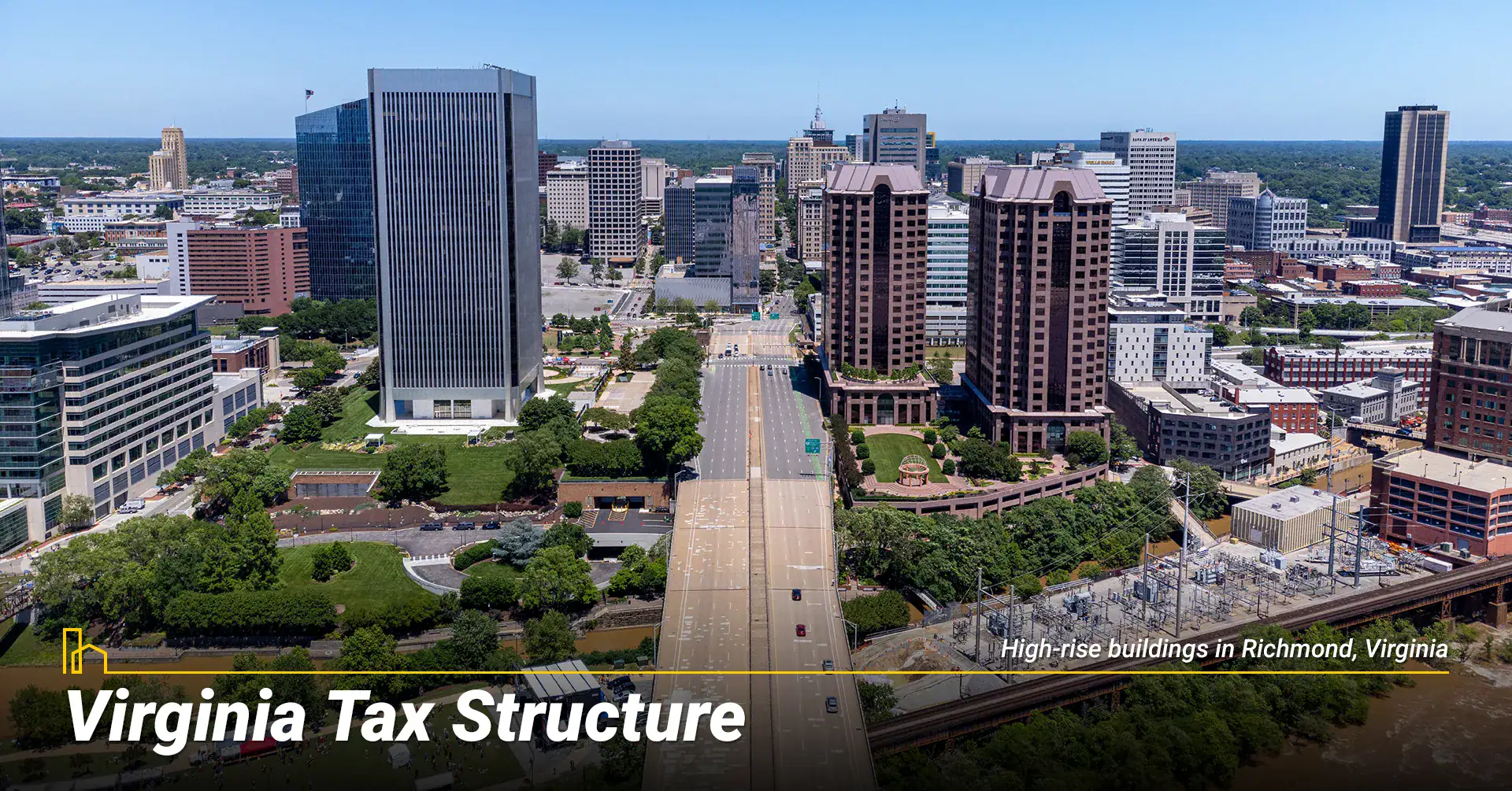
Virginia maintains a moderate tax structure with a progressive income tax ranging from 2% to 5.75% based on income levels. The state sales tax is 5.3% statewide, with additional local taxes bringing the average combined rate to 5.7%. Property taxes, with an effective average of 0.82%, are below the national average, but vary significantly by locality. Personal property tax on vehicles is assessed annually by local governments.
6. Best Places to Live in Virginia

A. Arlington/Northern Virginia: Urban Sophistication and Career Opportunities
Northern Virginia offers unparalleled career opportunities with easy access to Washington, D.C., and a sophisticated urban lifestyle. Advantages include excellent public transportation via Metro, world-class dining and cultural attractions, top-rated schools, and high-paying job opportunities across multiple industries. Considerations include higher housing costs and living expenses throughout the region.
B. Richmond: Historic Capital with Modern Amenities
Richmond combines rich historical significance with a thriving modern economy and vibrant arts scene. Advantages include affordable housing options, diverse cultural attractions, a growing food scene, and proximity to both mountains and coast. The city offers excellent job opportunities in finance, healthcare, and government sectors. Considerations include safety concerns and ongoing urban development challenges.
C. Virginia Beach: Coastal Living and Family-Friendly Communities
Virginia Beach provides exceptional coastal living with extensive beaches, family-friendly neighborhoods, and a strong tourism economy. Advantages include year-round outdoor recreation, excellent schools, military community support, and reasonable housing costs compared to other coastal areas. Considerations include hurricane risk and summer tourist congestion.
D. Charlottesville: College Town Charm and Wine Country
Charlottesville combines university town sophistication with stunning natural beauty and renowned wine country. Advantages include high quality of life, cultural attractions, excellent restaurants, and proximity to outdoor recreation. The presence of UVA creates a highly educated community atmosphere. Considerations include limited job market diversity and higher costs in desirable neighborhoods.
E. Roanoke: Affordable Mountain Living
Roanoke offers affordable living with spectacular mountain views and a growing healthcare sector. Advantages include low cost of living, friendly communities, outdoor recreation access, and reasonable commute times. The city provides small-town charm with modern services. Considerations include limited job market opportunities and fewer cultural amenities compared to larger cities.
Recommended for you
7. Planning Your Virginia Move

Successful relocation requires careful timeline planning and systematic task completion to avoid last-minute stress and complications. This detailed schedule breaks down essential activities by timeframe, ensuring you complete critical steps at optimal times. Following this timeline helps prevent costly mistakes, reduces moving day chaos, and ensures smooth integration into your new Virginia community with all legal requirements properly addressed.
| Timeline | Essential Tasks |
|---|---|
| 8 Weeks Before | Research Virginia cities and regions, calculate moving costs, begin decluttering |
| 6 Weeks Before | Gather important documents, obtain moving quotes, notify current employers |
| 4 Weeks Before | Schedule utility connections, research Virginia auto insurance, arrange mail forwarding |
| 2 Weeks Before | Confirm moving details, prepare essentials box, arrange temporary lodging |
| Moving Week | Execute move, conduct final walkthrough, travel with essential items |
| Upon Arrival | Set up utilities, register vehicle, obtain Virginia license, enroll children in schools |
=> Get the Relocation Guide & Checklist PDF — prepared for both Desktop and Mobile devices.
Settling In: Practical Essentials
A. Utilities Setup
Virginia utilities include Dominion Energy for electricity throughout most of the state, with some areas served by Appalachian Power and NOVEC. Natural gas is provided by various local utilities. Internet providers include Comcast Xfinity, Verizon Fios, and Cox Communications, offering high-speed options throughout most urban and suburban areas.
B. Legal Requirements
Register your vehicle and obtain a Virginia driver’s license within 30-60 days of establishing residency. Annual safety inspections are required for all vehicles, with emissions testing required in Northern Virginia and other designated areas. Update your voter registration and notify all financial institutions of your address change.
C. Community Integration
Join local hiking clubs, volunteer for historical societies, attend neighborhood association meetings, and participate in seasonal festivals to build connections quickly in Virginia’s welcoming communities. Many areas offer newcomer groups and social organizations specifically designed to help new residents integrate.
21 Best and Fun Things to do in Morgantown, West Virginia
Whether you are visiting Morgantown on vacation, getting ready to attend WVU, or looking to settle down permanently, you’ll want to check out all of the city’s best attractions…
8. Virginia’s Unique Requirements
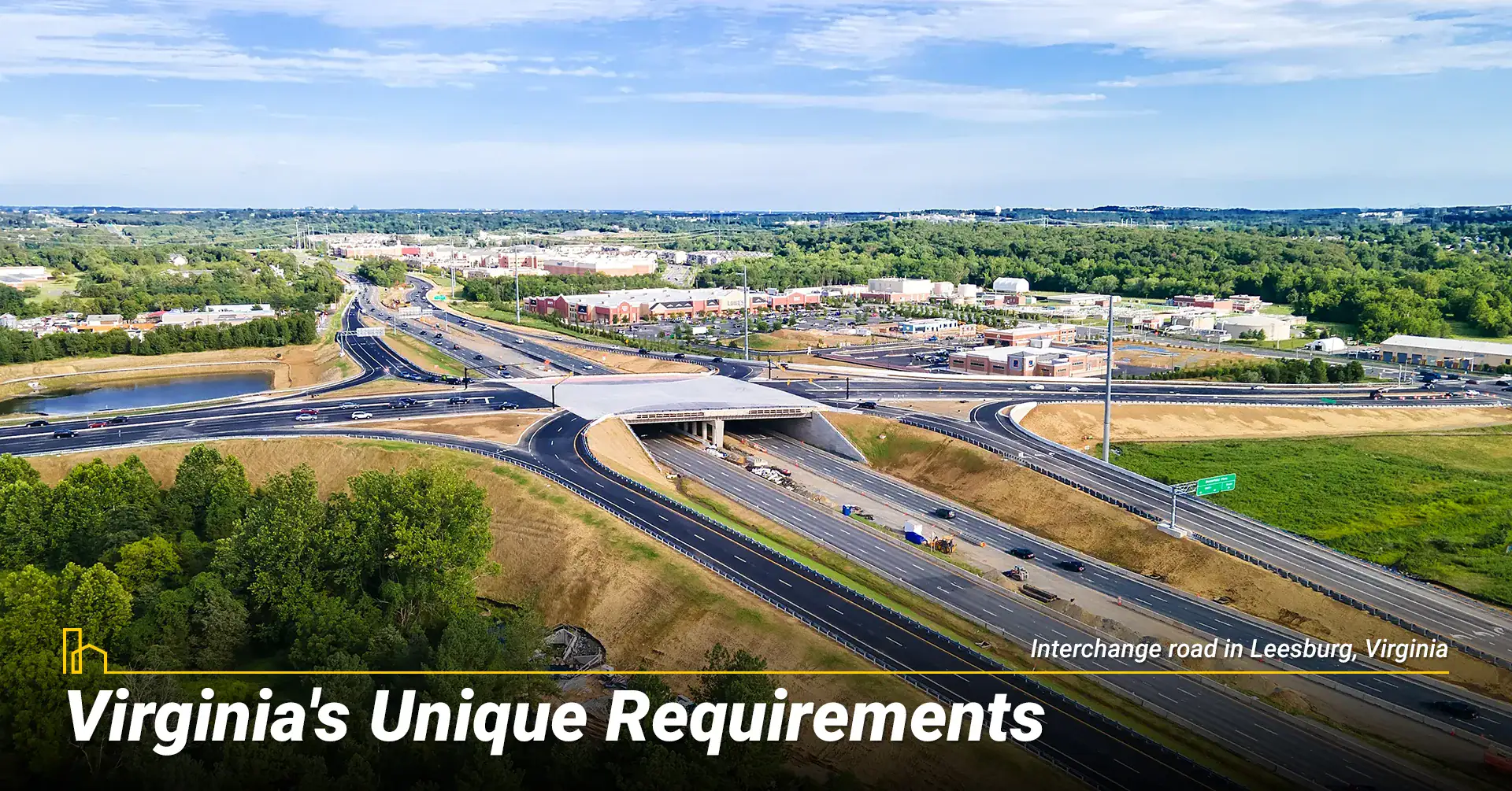
A. Vehicle Inspections and Personal Property Tax
Virginia requires annual safety inspections for all vehicles, with additional emissions testing required in some metropolitan areas. The state also assesses personal property taxes on vehicles, which are billed annually by local governments and can range from $200-$1,000+ depending on vehicle value and locality.
B. Hurricane and Weather Preparedness
Coastal residents should prepare for hurricane season (June-November) with emergency supplies, evacuation plans, and flood insurance. Mountain residents should prepare for winter weather with appropriate clothing, emergency supplies, and reliable heating systems.
C. Historic District Regulations
Many Virginia communities have historic district regulations that may affect property modifications and business operations. Research local preservation requirements if considering homes in historic areas.
20 Cool Things to do in Fredericksburg, Virginia
Fredericksburg is a history buff’s delight, with its many associations with George Washington and his family, and its proximity to four major Civil War battlefields, and the Fredericksburg and Spotsylvania National Military Park. The city has several museums and other historical sites…
9. Financial Planning
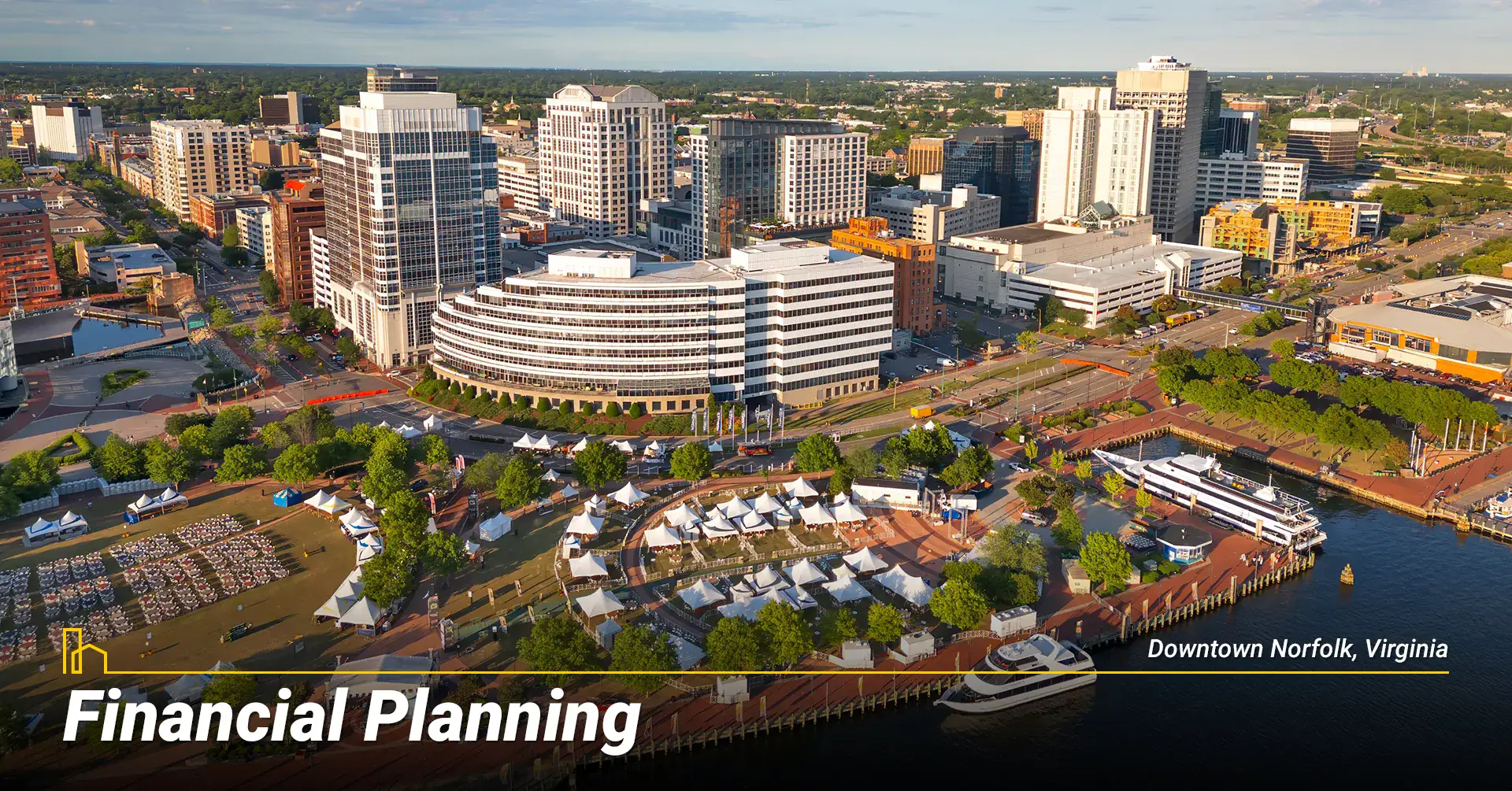
Virginia costs vary significantly by region. Budget for moving costs ($1,000-$10,000+), a security deposit (1-2 months’ rent), utility setup fees ($100-$400), vehicle registration and inspection costs ($50-$200), and an emergency fund (3-6 months’ expenses) to ensure a smooth transition to your new Virginia home.
Insider Tips from a Virginia Local
A. Embrace the History: Visit presidential homes, Civil War battlefields, and colonial sites to understand Virginia’s rich heritage and cultural significance.
B. Explore Wine Country: Virginia’s wine regions offer world-class vintages and beautiful countryside perfect for weekend getaways.
C. Use Public Transit in NOVA: Take advantage of Metro and VRE systems to avoid traffic and parking costs in Northern Virginia.
D. Plan for Seasonal Activities: From beach vacations to mountain leaf-peeping, Virginia offers year-round recreational opportunities.
E. Join Professional Networks: Virginia’s proximity to D.C. creates exceptional networking opportunities across industries.
Summary: Ready to make the move to the Old Dominion State? No state can match Virginia’s exceptional combination of career opportunities, natural beauty, and historical significance. Whether you’re seeking coastal living, mountain adventures, urban sophistication, or small-town charm, you’ll find your perfect fit in Virginia.
If you’ve decided to make the move, welcome to this historic and beautiful state!
Recommended for you
Frequently Asked Questions
1. Do I Need a Car in Virginia? Public transit works well in Northern Virginia, but most other areas require personal vehicles for daily convenience and accessing recreational areas.
2. How Safe Is Virginia? Virginia is generally very safe, consistently ranking among the safest states. Research specific neighborhoods and stay informed about local conditions.
3. What Are the Biggest Challenges for Newcomers? Understanding personal property taxes, vehicle inspection requirements, hurricane preparedness in coastal areas, and navigating Northern Virginia traffic patterns.
4. How Much Should I Budget for Moving? Plan $1,000-$10,000+ for moving costs plus security deposits, utility setup fees, vehicle registration, and emergency funds for unexpected expenses.
5. Is Virginia Family-Friendly? Absolutely! Excellent schools, safe neighborhoods, abundant family activities, and proximity to educational attractions like museums and historic sites.
6. What’s the Weather Like? Four distinct seasons with hot, humid summers and mild winters. Coastal areas experience milder winters, while mountains receive more snow.
7. What Steps Are Required After Moving? Register your vehicle within 30 days, obtain a Virginia license within 60 days, schedule required inspections, update voter registration, and notify all service providers.
8. How Are Virginia’s Taxes? Progressive income tax system with moderate rates, below-average property taxes, but additional annual personal property tax on vehicles.
9. What Are Virginia’s Best Cultural Attractions? Colonial Williamsburg, Monticello, Mount Vernon, Virginia Museum of Fine Arts, and numerous Civil War battlefields and presidential sites.
10. How Do I Establish Virginia Residency? Live in Virginia for at least 30 days, obtain a Virginia driver’s license, register to vote, and demonstrate intent to remain in the state through employment, property ownership, or other ties.
An Ultimate Guide to Moving for Home Buyers and Sellers
Buying and selling a home doesn’t make you an expert in moving. Buying and selling are much more different when you’re actually moving. Carefully go through the tips listed below and uses these as your ultimate guide whenever moving…
Table of Contents:
- Why Choose Virginia for Your Next Adventure?
- 1. The Old Dominion Experience
- 2. Cost of Living & Affordability in Virginia
- 3. Jobs, Economy, and Career Opportunities in Virginia
- 4. Education Excellence in Virginia
- 5. Virginia Tax Structure
- 6. Best Places to Live in Virginia
- 7. Planning Your Virginia Move
- 8. Virginia’s Unique Requirements
- 9. Financial Planning
- Insider Tips from a Virginia Local
- Frequently Asked Questions
Genevieve lives in Virginia. She has over 15 years of experience in writing and editing. She works with both fiction and non-fiction. As a freelancer, she has reviewed and edited audiobooks, articles, self-help books, fantasy and romance novels, and much more. As a mid-career professional, she has experience working in federal policy, program and project management, and cross-cultural communication. She is also a long-time member and officer of Toastmasters, a professional speaking organization, and is an accomplished improvisational comedian
HOMEiA is a city guide site where visitors can find detailed information about communities of interest. HOMEiA’s City Guides, created in partnership with local writers and editors, are curated lists of the best, safest, and most affordable places to live. The guides feature the HOMEiA Score, a proprietary index that rates communities on such factors as housing costs, education, employment, etc.
HOMEiA.com aims to be the premier site for people planning to relocate, providing them with insightful content and connecting them with skilled real estate professionals.
We also empower real estate professionals to establish or strengthen their web presence by highlighting their experience, knowledge and achievements. If you’re selected to join our list of certified real estate professionals, you will distinguish yourself from your peers — and earn HOMEiA’s support.
If you believe in HOMEiA’s mission, please share our website with others.
Table of Contents:
- Why Choose Virginia for Your Next Adventure?
- 1. The Old Dominion Experience
- 2. Cost of Living & Affordability in Virginia
- 3. Jobs, Economy, and Career Opportunities in Virginia
- 4. Education Excellence in Virginia
- 5. Virginia Tax Structure
- 6. Best Places to Live in Virginia
- 7. Planning Your Virginia Move
- 8. Virginia’s Unique Requirements
- 9. Financial Planning
- Insider Tips from a Virginia Local
- Frequently Asked Questions

